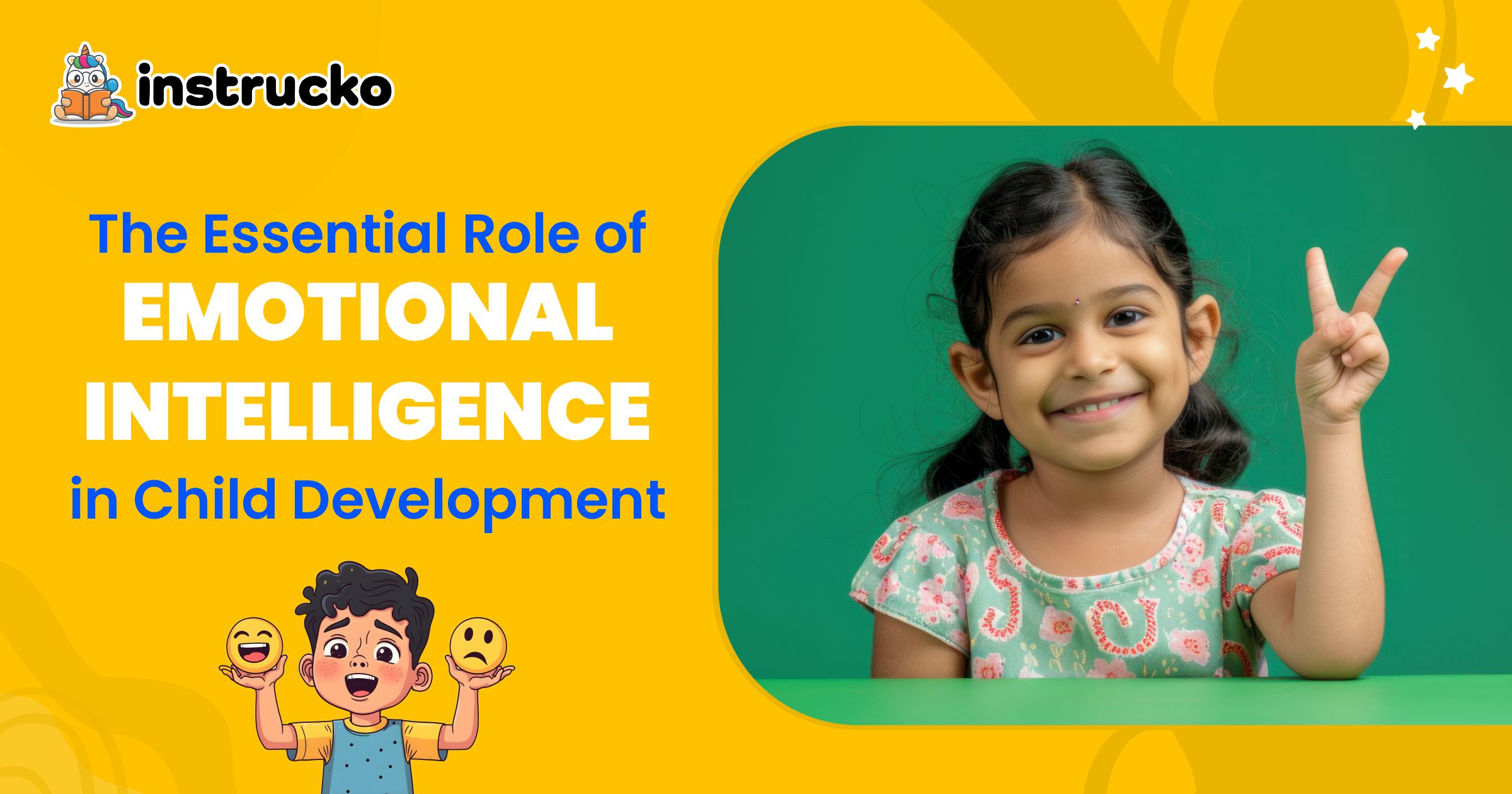In today’s world, emotional intelligence (EQ) is considered as important, if not more so, than intellectual intelligence (IQ). Emotional intelligence encompasses the ability to understand, manage, and express one’s emotions healthily, as well as the capacity to empathise with others. For children, developing EQ is foundational, impacting their academic performance, relationships, and long-term mental health. This blog explores why emotional intelligence is so essential in child development and how parents, educators, and caregivers can foster this skill from a young age.
Why Emotional Intelligence Matters?
Emotional intelligence is more than a set of soft skills; it’s a critical part of a child’s overall development. Studies show that children with high emotional intelligence are better able to manage stress, communicate effectively, and navigate social complexities. They are often more resilient, adaptable, and self-confident. Importantly, emotional intelligence provides children with tools to make sound decisions and approach challenges with a positive mindset.
Key Benefits of Emotional Intelligence in Children
Better Academic Performance
Children with strong emotional skills are more focused and better at managing time, allowing them to concentrate on tasks. EQ encourages resilience, which can help kids persevere through challenging subjects or complex assignments.
Improved Social Skills
Emotional intelligence enables children to recognise their own emotions and read others’ emotional cues. This awareness fosters empathy, compassion, and kindness, laying the groundwork for healthy relationships with peers, teachers, and family members.
Increased Resilience
Kids with high EQ are often better equipped to handle setbacks. Emotional intelligence helps them process and learn from their emotions rather than being overwhelmed by them, which builds resilience and grit.
Enhanced Self-Esteem
Understanding one’s emotions leads to better self-acceptance, which in turn boosts confidence. When children feel secure in themselves, they are more likely to take risks, try new things, and engage with the world around them.
Long-Term Mental Health
Developing emotional intelligence from a young age contributes to better mental health in the long run. By learning to manage stress, anxiety, and disappointment, children can build a solid foundation for their well-being.
How Emotional Intelligence Develops in Children
Emotional intelligence develops gradually as children grow and interact with their environment. Parents, teachers, and other caregivers play crucial roles in guiding children through these stages. Typically, children’s EQ development follows these stages:
Recognising Emotions: Young children begin by identifying basic emotions such as happiness, sadness, and anger. Through observation and social interaction, they learn that everyone has feelings and that these emotions vary depending on the situation.
Understanding Causes and Effects: As children grow, they start to understand why they feel certain ways in response to specific events. This stage often involves recognising the causes of others’ emotions, which helps build empathy.
Managing Emotions: Older children learn techniques to control or express emotions in healthy ways. This skill is essential for self-regulation and includes practices like deep breathing, positive self-talk, and mindful reflection.
Building Empathy: In later childhood, children develop the ability to place themselves in others' shoes, fostering compassion. Empathy is a cornerstone of social relationships and an essential component of EQ.
Strategies to Foster Emotional Intelligence in Children
Fostering emotional intelligence is not a one-time lesson but rather an ongoing process. Here are some strategies that parents and educators can use to help children develop their emotional intelligence:
Encourage Open Communication
Create an environment where children feel safe expressing their feelings. Encourage them to talk about their emotions and provide them with vocabulary to name what they are feeling. For instance, instead of just saying they are “sad,” children might say they feel “disappointed” or “left out.” This level of specificity allows children to process emotions more clearly.
Model Emotional Intelligence
Children learn a great deal from observing the adults around them. By demonstrating calmness, empathy, and patience, parents and teachers can serve as powerful role models. Show children how you manage emotions in difficult situations, such as taking deep breaths or calmly discussing a problem.
Teach Problem-Solving Skills
Help children approach challenges by breaking them down into manageable steps. Teach them to identify their feelings, consider possible solutions, and think about the consequences. Problem-solving builds resilience and encourages children to take ownership of their emotional responses.
Use Storytelling as a Tool
Books and stories are excellent resources for discussing emotions with children. Stories often explore complex themes, including fear, friendship, and disappointment, in ways that are relatable and accessible. Reading together can prompt discussions about characters’ feelings and help children reflect on similar situations in their own lives.
Practice Mindfulness and Reflection
Mindfulness activities like deep breathing, yoga, or quiet reflection can help children stay calm and focused. These practices encourage self-awareness and provide children with tools to manage stress. Simple mindfulness exercises can be a great addition to a daily routine.
Celebrate Emotional Wins
Recognise and celebrate moments when children successfully manage their emotions, show empathy, or resolve a conflict peacefully. Positive reinforcement strengthens these behaviours and boosts children’s confidence in their emotional intelligence skills.
Challenges and Misconceptions in Teaching EQ
While the benefits of emotional intelligence are well-established, teaching EQ to children isn’t always straightforward. Some common challenges and misconceptions include:
EQ Can’t Be ‘Taught’ Like Academics
Unlike subjects such as maths or science, EQ is not a set of facts or formulas. It’s experiential, meaning it’s developed through real-life situations and social interactions rather than traditional classroom learning.
Emotions Are a Sign of Weakness
Sometimes, emotions are incorrectly viewed as a distraction from rational thinking. In reality, emotions are a natural and valuable part of the human experience. Teaching children that emotions are not weaknesses but signals helps them manage these feelings constructively.
Children Will ‘Grow Out’ of Emotional Issues
It’s common to assume that children’s emotional struggles will resolve on their own over time. However, research indicates that early interventions can make a significant difference in a child’s EQ development.
The Long-Term Impact of Emotional Intelligence
The benefits of emotional intelligence extend far beyond childhood. Adults with high EQ tend to be more successful in their personal and professional lives, as they are better able to handle stress, work effectively in teams, and communicate with empathy. By helping children develop emotional intelligence from a young age, we are giving them tools that will serve them throughout their lives.
In our increasingly complex and interconnected world, EQ is more critical than ever. While academic skills are important, EQ allows individuals to navigate life’s ups and downs, form meaningful relationships, and contribute positively to society. As parents, teachers, and caregivers, fostering emotional intelligence in children is one of the most powerful and lasting gifts we can offer.








